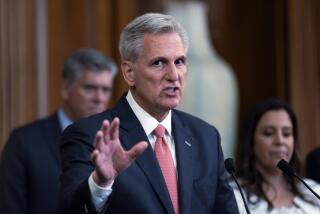Happiness Is a Gimmick : Balanced-budget amendment won’t balance budget, or fool anyone
- Share via
Congress may be ready to give the green light to a proposed constitutional amendment that would require a balanced federal budget. Sounds good in an election year? Right, too good. Washington’s newfound enthusiasm for fiscal discipline is a cynical political exercise.
A balanced-budget amendment could create bigger problems than it solves. It’s bad policy. Nevertheless, Congress looks to be going for it. Even longtime foes to the idea, such as House Speaker Tom Foley, appear to be giving in to the stampede on Capitol Hill to support a constitutional ban on deficit spending. Different bills are wending their way through the House and Senate. A House vote could come soon.
In concept, holding the executive and legislative branches firmly accountable for sound budgeting--or at the minimum keeping the deficit manageable--is desirable. Poll after poll shows that taxpayers are fed up with the nation’s $4.1-trillion debt.
That said, the constitutional amendment route is cumbersome and problematic. If the President and Congress, apparently in rare and suspicious agreement on this issue, are so inclined, they can simply begin the budgetary-balancing process. By contrast, a balanced-budget amendment, if approved by Congress, must be ratified by 38 state legislatures and would take effect, at the earliest, in 1997. Who needs another amendment? Just start balancing the books.
Moreover, a constitutional requirement cannot be constructed rigorously or loosely enough to guarantee no new taxes. It would only define the objective of a balanced budget. The executive and legislative branches would continue to make spending decisions. Challenges to their choices might end up in courts, which could be the ultimate arbiter of fiscal policy. No other industrial nation requires a balanced budget, which could be a straitjacket during an economic downturn, when deficit spending might be unavoidable and advisable.
Public disgust with Congress is understandable. Gramm-Rudman in 1985 was a budget-balancing act but Congress found ways around it twice--to finance the costly savings-and-loan bailout and to try to maneuver around the recession. The 1990 budget agreement called for a five-year, $500-billion deficit-cutting plan. We’re at halftime but this year’s deficit alone is almost $400 billion.
A rare voice of reason is House Budget Committee Chairman Leon E. Panetta (D-Carmel Valley), who warns that an amendment will mean slashing the deficit another $600 billion in addition to the budget agreement’s $500 billion. Looks like spending cuts and tax increases are inevitable. Yet the White House insists, “We can balance the budget by wise spending cuts and economic growth without tax rate increases.” George Bush once called that voodoo economics.
More to Read
Get the L.A. Times Politics newsletter
Deeply reported insights into legislation, politics and policy from Sacramento, Washington and beyond. In your inbox twice per week.
You may occasionally receive promotional content from the Los Angeles Times.










